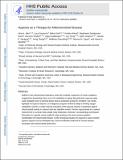Hypoxia as a therapy for mitochondrial disease
Author(s)
Jain, I. H.; Zazzeron, L.; Goli, R.; Alexa, K.; Schatzman-Bone, S.; Dhillon, H.; Goldberger, O.; Peng, J.; Goessling, W.; Zapol, W. M.; Mootha, V. K.; Shalem, Ophir; Sanjana, Neville E; Zhang, Feng; ... Show more Show less
Downloadnihms-780675.pdf (1.275Mb)
OPEN_ACCESS_POLICY
Open Access Policy
Creative Commons Attribution-Noncommercial-Share Alike
Terms of use
Metadata
Show full item recordAbstract
Defects in the mitochondrial respiratory chain (RC) underlie a spectrum of human conditions, ranging from devastating inborn errors of metabolism to aging. We performed a genome-wide Cas9-mediated screen to identify factors that are protective during RC inhibition. Our results highlight the hypoxia response, an endogenous program evolved to adapt to limited oxygen availability. Genetic or small-molecule activation of the hypoxia response is protective against mitochondrial toxicity in cultured cells and zebrafish models. Chronic hypoxia leads to a marked improvement in survival, body weight, body temperature, behavior, neuropathology, and disease biomarkers in a genetic mouse model of Leigh syndrome, the most common pediatric manifestation of mitochondrial disease. Further preclinical studies are required to assess whether hypoxic exposure can be developed into a safe and effective treatment for human diseases associated with mitochondrial dysfunction.
Date issued
2016-04Department
Massachusetts Institute of Technology. Department of Biological Engineering; Massachusetts Institute of Technology. Department of Brain and Cognitive Sciences; McGovern Institute for Brain Research at MITJournal
Science
Publisher
American Association for the Advancement of Science (AAAS)
Citation
Jain, I. H. et al. “Hypoxia as a Therapy for Mitochondrial Disease.” Science 352, 6281 (February 2016): 54–61 © 2016 American Association for the Advancement of Science
Version: Author's final manuscript
ISSN
0036-8075
1095-9203